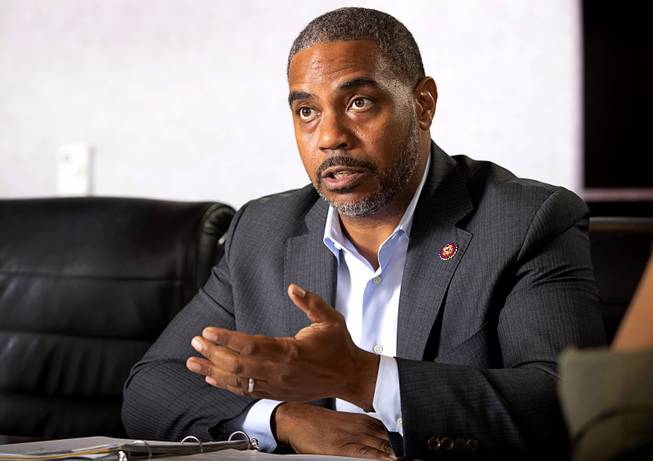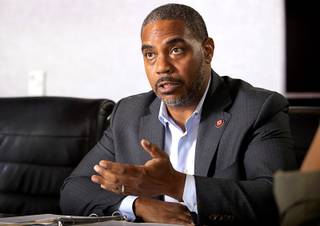
Congressman Steven Horsford, D-Nev., responds to a question during an editorial board meeting at the Las Vegas Sun offices in Henderson Thursday, Aug. 1, 2019.
Thursday, Aug. 15, 2019 | 2 a.m.
When U.S. Rep. Steven Horsford hears from his constituents, the top issue they bring up is bringing down the cost of health care, the second-term congressman said in a recent meeting with the Las Vegas Sun editorial board.
Horsford, a Democrat who represents the vast 4th Congressional District that stretches the width of Nevada, from Utah to California, and from North Las Vegas in the south to the upper reaches of White Pine County, said the topic is the same no matter where his constituents call home.
“I get the same questions about health care costs in my rural areas as I get from residents in North Las Vegas or the northwest part of Las Vegas,” he said.
To that end, Horsford is proud of the House’s work on health care issues — 10 pieces of legislation passed that continue to await action by the U.S. Senate.
But health care is only part of the work for a congressman. Here are five topics Horsford touched on during his interview with the Sun.
Affordable Care Act
“We have passed 10 health care bills that would directly lower the cost of health care in one way or the other (and sent them on) to the Senate,” he said.
The legislation, he said, deal with “shoring up” the Affordable Care Act and “reversing a lot of the sabotage that came from the GOP” in terms of actions like underfunding parts of the ACA, he said.
Horsford criticized the lawsuit Texas v. Azar, which aims to declare the ACA unconstitutional due to the reduction of the individual mandate — the penalty uninsured people had to pay to the federal government — to $0. Opponents claim that without the individual mandate, the law is no longer a tax, and therefore the Supreme Court’s 2012 decision to keep the law in place as an exercise of the government’s taxing power is moot. While deflecting Republican criticism and attempts to repeal the ACA, Horsford said the landmark law needed to be improved upon.
“The Affordable Care Act is not perfect,” Horsford said. “Neither was Social Security or Medicare when they were first enacted. It is a work in progress, and part of what our focus has been is to make the improvements to the Affordable Care Act that we knew needed to be made.”
Prescription affordability
Horsford said another health care issue, and one that he had been “laser-focused” on, was prescription affordability. He said he often hears from constituents even with health insurance who cannot afford their prescription drugs.
“This is really just one of the most important things that I think this Congress has to address in a bipartisan way,” he said.
Horsford introduced the Stopping the Pharmaceutical Industry from Keeping Drugs Expensive Act with Republican New York Rep. Tom Reed. The SPIKE Act would require drug companies to justify large price increases to the secretary of health and human services.
A statement describing the legislation notes that it requires drug manufacturers justify price increases in three instances: if a drug has a price increase of more than 10 percent or $10,000 over one year; if a drug has a price increase of 25 percent or $25,000 over three years; or if a drug has a launch price higher than $26,000.
Other actions he touted included a push to allow Medicare to negotiate prices directly with drug companies. In a recent guest column in the Sun, he said he had co-sponsored the Medicare X Choice Act, which would allow the secretary of health and human services to negotiate drug prices under Medicare Part D, which helps Medicare recipients pay for self-administered prescription drugs.
A replacement for NAFTA
The United States-Mexico-Canada Agreement, a replacement for the North American Free Trade Agreement championed by the Trump administration, is still working its way through the congressional process after being signed by the countries’ leaders in late 2018.
Horsford sits on the House Ways and Means Committee, the lower chamber's panel tasked with overseeing trade and tariffs. He said that NAFTA had hurt American workers, businesses — particularly small businesses — and consumers, and that he wanted to “get to yes” on the replacement agreement.
“I believe that NAFTA is outdated, that we need a new trade agreement with Mexico and Canada,” he said.
But a few remaining issues need to be settled going forward to earn his support, including worker protections, particularly around collective bargaining in Mexico,
“They passed some legislation through the Mexican government recently, but we’re looking to see how that’s actually going to get implemented and enforced — enforcement of the trade policy is the biggest issue out there,” he said.
Other issues he listed were ensuring environmental standards are adhered to across the board so businesses in other countries won’t end up with advantage over others and ensuring pharmaceutical patent standards in any agreement didn’t work against current efforts in Congress on the issue.
“What I didn’t want was a to have an exclusivity period (for the patent) for drug manufacturers that was longer in Mexico, thereby giving those drug manufacturers more control when we’re working here to potentially lower the number of years that they have patent exclusivity,” he said.
He said U.S. Trade Representative Robert Lighthizer was aware of the issues, and that enforcement going forward would be a key part of any plan.
“Without enforcement, none of it matters,” he said.
Yucca Mountain
Shortly after his sit-down with the Sun, Horsford was set to tour Yucca Mountain, the nexus of a decades-long debate over whether it should be the nation’s permanent nuclear waste storage facility.
Horsford opposes the plan.
He said there were Democrats on the House Appropriations Committee who had voted for pro-Yucca legislation in the past, including in favor of a Republican-sponsored amendment that would have restarted the licensing process for the repository.
“When we started talking to members of the House Appropriations Committee, 14 of the Democrats had previously voted last Congress for the Republican amendment that would screw Nevada and start the process to relicense and bring back funding,” he said.
He said 11 of the 14 Democratic members flipped when the amendment was brought back up in May. It was ultimately defeated.
“We were very vigilant because I understood that this could not happen on my watch. … We worked really, really hard to defeat that amendment,” he said.
President Donald Trump
Horsford criticized President Donald Trump’s racist statements against the “squad,” a progressive group of freshman House members made up of four women of color.
The President tweeted that the congresswomen should “go back” to their countries of origin, despite three of the members being born here and the other being a naturalized American citizen.
Horsford said Trump’s language used was “unacceptable,” but that he found the president’s “racist, bigoted and discriminatory” policies and actions to be worse.
Horsford criticized the lack of diversity in Trump’s picks to sit on the federal judiciary, saying these judges will be able to make decisions around women’s issues, LGBTQ rights, immigrant rights and more.
“What he says is one thing, what he is doing every single day to undermine our democracy and to weaken who we are as a nation and to divide us as a people, I think, is even more harmful and something that all of us should be standing against,” Horsford said.

